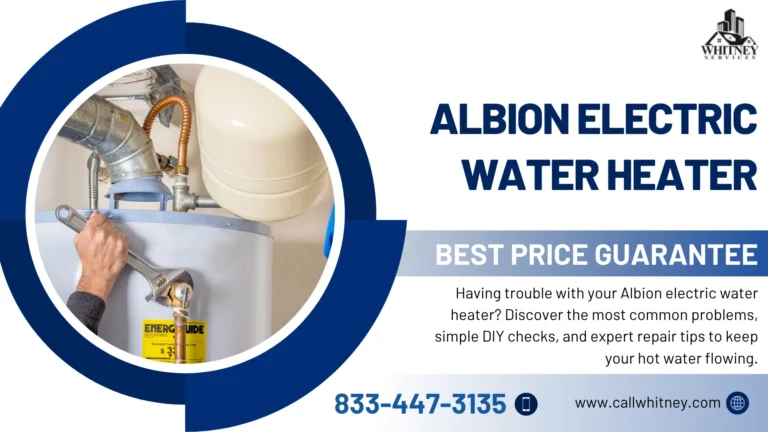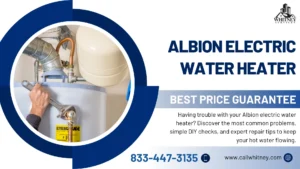There’s nothing quite like stepping into a hot shower on a chilly morning. But when your Albion electric water heater stops working properly, that comfort can turn into frustration fast. Whether you’re facing cold water, strange rumbling sounds, or rising energy bills, you’re not alone—these are common issues many homeowners encounter.
This guide walks you through the most frequent Albion water heater problems and their fixes, shares simple maintenance tips, and helps you know when to call a professional. If you’re in Albion or nearby areas, Whitney Services is your go-to team for dependable plumbing services and water heater services. Let’s get started!
Key Takeaways
- The Albion electric water heater is reliable and efficient but requires routine care to stay in top shape.
- Many common issues—such as no hot water, inconsistent temperatures, or strange noises—can be fixed with simple checks or preventive maintenance.
- Understanding whether to repair or replace your unit can save you both time and money.
- Local experts like Whitney Services in Albion offer trusted plumbing services and professional water heater support.
How Albion Electric Water Heaters Work
An Albion electric water heater is designed to store and heat water using electrical heating elements inside a well-insulated tank. It includes thermostats that regulate temperature, an anode rod that prevents rust, and a T&P valve for safety.
Over time, these components can wear out, collect mineral deposits, or corrode—especially if your water supply has a high mineral content. When that happens, your heater might start making noises, take longer to heat water, or even leak.
Understanding how your water heater functions helps you troubleshoot small issues before they become big repairs. For example, if you ever find yourself asking, “Why is my Albion electric water heater not heating?”, your thermostat and circuit breaker settings should be checked first.Often, it’s something simple that can be fixed without replacing the entire unit.
Common Problems & Step-by-Step Fixes
No Hot Water
This is one of the most common frustrations for homeowners. The likely causes include:
- A tripped circuit breaker
- A faulty thermostat
- Burned-out heating elements
- Loose or damaged wiring
Quick Fixes:
- Reset the breaker and inspect the electrical panel in your house.
- Ensure the thermostat is set between 120°F and 125°F.
- If you’re comfortable, test the heating elements using a multimeter and replace them if needed.
- If you notice scorched wiring or smell burning, call a licensed plumber or electrician immediately.
Sometimes, a quick reset is all it takes to bring your water heater back to life. But if the problem keeps coming back, it may be time to schedule a professional inspection with Whitney Services.
Not Enough Hot Water or Fluctuating Temperature
If your hot water runs out too quickly or fluctuates in temperature, sediment buildup could be to blame. Over time, minerals settle at the bottom of your tank, reducing its ability to heat efficiently.
Fix:
- Drain and flush the tank to remove sediment.
- Check both heating elements for proper function.
- If your household demand has increased (like adding another bathroom), consider upgrading to a larger tank.
A consistent supply of hot water depends on a well-maintained system. Flushing your tank once a year can help prevent many of these temperature issues.
Strange Noises Coming from the Tank
Popping, hissing, or rumbling sounds often indicate sediment or mineral buildup at the bottom of the tank. This sediment traps heat, causing small “boiling” pockets that make noise.
Fix:
Flush the tank with clean water until the sediment clears. If the noise persists, a professional plumber can inspect for damaged heating elements or trapped air.
Leaks from the Tank or Fittings
A small leak might not seem serious, but it can quickly lead to water damage or even tank failure. Leaks may stem from:
- Loose fittings
- A faulty T&P valve
- Internal corrosion
Fix:
Tighten visible connections, check the T&P valve for leaks, and replace it if necessary. If the tank itself is corroded, the only solution is replacement. Whitney Services can recommend and install a new system that matches your home’s needs.
Tripping Circuit Breaker or Electrical Issues
If your circuit breaker keeps tripping, you could have a short circuit in the heating element or faulty wiring.
Fix:
Shut off power immediately and call an experienced plumber or electrician. Electrical issues should always be handled professionally for safety reasons.
Rusty or Discolored Water
If your hot water looks brown or rusty, your anode rod may be worn out. The anode rod protects your tank from corrosion, and once it’s depleted, rust can form inside.
Fix:
Replace the anode rod every 2–3 years to extend your heater’s lifespan. If corrosion has already spread inside the tank, a replacement may be necessary.
Running Out of Hot Water Too Fast
If your hot water disappears after just one or two uses, your system might be undersized or suffering from efficiency loss.
Fix:
Perform a full tank flush, check your thermostat settings, and consider whether your household’s water use has increased. If your tank is simply too small, it may be time for an upgrade.
Preventive Maintenance Tips
Regular care keeps your Albion electric water heater running efficiently and helps prevent expensive repairs.
Here’s a quick maintenance checklist:
- Flush the tank every 6–12 months.
- Inspect and replace the anode rod every few years.
- Test the T&P valve annually for safety.
- Keep the area around the tank free of clutter and dust.
- Schedule a professional inspection from Whitney Services once a year.
These small steps can make a big difference in the performance and longevity of your water heater.
What is the Average Lifespan of an Electric Water Heater?
On average, a traditional electric water heater lasts between 10 and 15 years with proper maintenance. Tankless systems can last even longer—up to 20 years or more. Your heater’s lifespan depends on usage, water quality, and how well you maintain it.
If your unit is over 10 years old and starting to show issues like frequent repairs or leaks, it may be more cost-effective to invest in a new one.
What is the Downside of an Electric Tankless Water Heater?
While tankless systems offer endless hot water and improved energy efficiency, they also come with a few downsides.
- Higher upfront cost compared to storage tanks
- Possible need for electrical upgrades
- Limited flow if multiple taps run simultaneously
However, for smaller households or energy-conscious homeowners, the long-term savings often outweigh the initial expense.
Which Electric Hot Water Heater is the Best?
The “best” electric water heater depends on your household size, energy needs, and budget. Albion models are known for their reliability, but always choose a heater with a solid warranty, high energy efficiency, and good local service support.
When in doubt, talk to the professionals at Whitney Services. They can help you choose the right system and ensure it’s installed safely and efficiently.
Who Makes the Longest-Lasting Electric Water Heater?
The secret to a long-lasting water heater isn’t just the brand—it’s the build quality, maintenance, and installation. Units made with thick steel tanks, quality anode rods, and good insulation generally last the longest. Combine that with proper care, and your Albion heater could serve you for well over a decade.
Is It Worth Fixing a 10-Year-Old Water Heater?
If your water heater is about 10 years old, consider the nature of the repair. If it’s something simple like a thermostat or heating element replacement, go ahead and fix it. But if the tank is leaking or heavily corroded, replacement is usually the smarter choice.
Remember, even if the repair is affordable, efficiency often drops in older units, meaning higher energy bills over time.
Is It Cheaper to Repair or Replace a Heater?
In the short term, repairs are less expensive. But frequent repairs on an old or inefficient water heater can add up quickly. As a general rule, if the repair cost exceeds 50% of the replacement cost, go for a new heater. A modern, energy-efficient model can also lower your monthly utility bills and improve water heating performance.
Will My Electric Bill Go Up with a Tankless Water Heater?
Not necessarily. While tankless heaters require more power when running, they heat water only when needed—unlike storage tanks that constantly maintain water temperature. Over time, this usually results in lower overall energy usage and reduced utility bills, especially for smaller households.
Why Choose Whitney Services
When it comes to plumbing services in Albion, Whitney Services is the name locals trust. Here’s why homeowners keep choosing us:
- Friendly, certified professionals who care about doing the job right.
- Years of experience with Albion electric water heater systems and installations.
- Fast response times for repairs and emergencies.
- Honest pricing with no hidden fees.
- Locally owned and operated, so we treat your home like our own.
Whether you need a quick fix, a full replacement, or just expert advice, Whitney Services has you covered. Give Whitney Services a call today to schedule your service.
Conclusion
Your Albion electric water heater plays a vital role in your home’s comfort. A little maintenance and early attention to warning signs can prevent big problems down the road.
If you ever find yourself unsure about a repair or need professional support, Whitney Services is here to help. With expert plumbing services and reliable water heater services, we’ll make sure your showers stay hot and your home stays comfortable.
Frequently Asked Questions
Once a year is ideal, but if your home has hard water, every six months helps keep sediment under control.
Only if you’re confident working with electrical systems. Always turn off power and water first, and if you’re unsure, call a licensed plumber.
Prices vary depending on size, efficiency, and installation complexity. It’s best to get a free estimate from Whitney Services for an accurate figure.
Yes. Regular checks on the anode rod, thermostat, and tank can help prevent costly breakdowns.
If water collects only during heating cycles, it might be condensation. But if you see steady dripping or corrosion marks, it’s likely a leak that needs attention.







